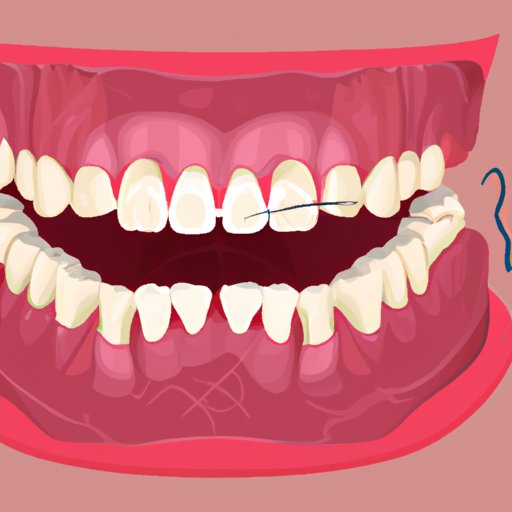
Introduction
Accidentally swallowing anything can be quite scary, especially when it comes to hard objects like a tooth. If you’re an adult, you may be under the impression that you’re beyond the age of losing teeth, however, anything from an injury to a loose tooth can result in it being swallowed. In this article, we’ll take a closer look at the dangers of swallowing a tooth, the types of teeth that are most commonly swallowed, personal stories, what to do if it happens, and more.
What to do if you accidentally swallow a tooth?
Accidentally swallowing a tooth can be pretty scary. It’s essential to understand the dangers involved before taking any step. A small baby tooth may not be a cause for concern, but swallowing a larger tooth can lead to many problems. If you accidentally swallow a tooth, the first thing you should do is remain calm. Do not induce vomiting or coughing and avoid eating and drinking until you see your emergency doctor or dentist.
Understanding the anatomy of a tooth
A tooth has two primary sections, the crown and root, with several parts performing different functions. The crown is visible above the gum line, and the roots anchor the tooth to the jawbone. Inside the tooth, there are layers of enamel, dentin, and pulp, with blood, lymphatic vessels, and nerves supplying it. The pulp contains blood vessels and nerves aiding in its development but isn’t essential for a tooth’s function once it has matured.
Although the digestive system is designed to break down and absorb all sorts of food and foreign objects, swallowing a tooth is not considered normal or natural.
Tips from dental professionals on preventing tooth swallowing
The ideal way to avoid swallowing a tooth is to keep them from falling out or getting dislodged in the first place. Avoid chewing on ice, hard candies, or anything that could cause teeth to crack or break. If you grind or clench your teeth, wear a mouthguard to protect them, and don’t let children under the age of six eat food that requires excessive chewing. Additionally, it’s important always to chew your food well before swallowing it to avoid accidentally swallowing a tooth.
Different types of teeth and the impact when swallowed
Most swallowed teeth are baby teeth that have loosened and dislodged from the gums naturally, so the risk of internal injury is relatively low. The teeth that pose greater danger tend to be permanent teeth, particularly molars, that are larger and take longer to emerge and, thus, have developed longer roots. If you accidentally swallow a tooth, call your emergency dental professional, and inform them what type of tooth, how big, and when it was swallowed.
Personal stories of people who have swallowed teeth
Accidentally swallowing a tooth can happen to anyone, just ask anyone, and they would have a story to tell. Almost all stories have happy endings, but it’s good to know what to expect or the risks and to err on the side of caution. Personal stories do vary, but please avoid any suggestion that could be quite alarming or promoting dangerous behavior.
Digestion of a tooth and the body’s response
The body’s digestive system doesn’t recognize a tooth as food, so a swallowed tooth will typically pass through the gastrointestinal tract without incident. It’s essential to keep an eye out for any stomach discomfort, abdominal pain, trouble breathing, or any other symptoms that could indicate a problem.
The potential outcomes of swallowing a tooth and how likely each one is
The likelihood of adverse reactions after accidentally swallowing a tooth is pretty slim, but there is still a possibility. The most common symptoms are feeling like something is stuck in your throat or abdominal cramps. In rare cases, a swallowed tooth may injure the digestive tract, which could cause severe pain and bleeding, although it’s not common.
Conclusion
Accidentally swallowing a tooth may not be a common occurrence, but it’s not unheard of. If it happens, remember to stay calm and avoid panicking. Remember not to induce vomiting. Although swallowing a tooth may not always result in complications, it’s best to be cautious. If you experience any symptoms, contact your doctor or dentist immediately for professional advice. Avoid anything that can cause teeth to break, and teach your children to chew their food thoroughly, and with good luck, you’ll never have to experience swallowing a tooth, ever.




